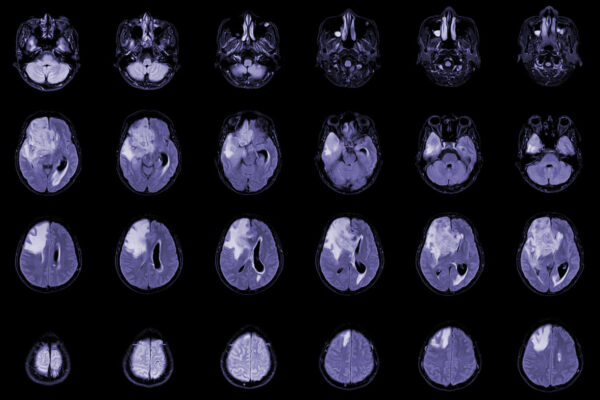
Glioblastoma multiforme (GBM), the deadliest malignant brain tumor, also represents a large proportion of all cerebral neoplasms1. Despite strides in immunotherapy, including Chimeric Antigen Receptor (CAR)-T cells, challenges like on-target off-tumor toxicity, the blood-brain barrier, and the immunosuppressive tumor microenvironment (TME) have hindered progress. Nonetheless, advancements are still being made. One example is a research group reporting the use of a synthetic Notch receptor system, known as ‘synNotch,’ for the development of innovative T cell circuits, ‘synNotch-CART,’ yielding enticing success in mice2.
In response to the limitations posed by conventional CAR T cells in GBM treatment, synNotch-CAR T cells operate on a ‘prime-and-kill’ strategy. In contrast to simpler CAR-T cell designs, synNotch-CAR T cells exhibit a targeted response. CAR expression only begins once contact occurs between the extracellular domain of the synNotch construct and its target ligand, brevican, a brain-specific molecule. This triggers cleavage and release of the intracellular domain of synNotch, relaying the signal inward to begin manufacturing CAR molecules. Being a characteristic feature in a significant percentage of GBM patients, EGFR was chosen as the target ligand for the CAR construct to minimize off-tumor toxicity.
A preclinical immunocompetent mouse model was used. To simulate the overproduction of EGFR in GBM, the researchers expressed the extracellular domain of mouse EGFR in a syngeneic glioma cell line, SB28, creating SB28-mEGFR cells. The team then introduced the novel synNotch-CAR circuit, termed mBSYNC.
The engineered T cells demonstrated higher persistence within the GBM TME, marked by increased infiltration of immune-activating CD86+ and MHC-IIhi macrophages. Simultaneously, the infiltration of immunosuppressive CD206+ macrophages decreased significantly, painting a promising picture of the potential impact of synNotch-CAR T cells on the TME.
Perhaps the most striking outcome of the study was the significant improvement in survival rates. A single intravenous infusion of mBSYNC synNotch-CAR T cells not only prolonged survival but completely eradicated aggressive tumors in a notable portion of the mouse cohort. The study hints at the pro-inflammatory activity induced in endogenous myeloid cells as a potential contributor to the anti-tumor efficacy observed with synNotch-CAR T cells.
The convergence of synthetic biology and immunotherapy opens wide avenues for further research in overcoming the challenges holding back progress in cell therapies for brain tumors, and for solid tumors generally.
Reference
- Bikfalvi, A., Alves da Costa, C., Avril, T., et al. (2023). Challenges in glioblastoma research: focus on the tumor microenvironment. Trends in Cancer, 9(1), 9-27. doi.org/10.1016/j.trecan.2022.09.005.
- Lakshmanachetty, S., Simic, M., Watchmaker, P., et al. (2023). SynNotch-CAR T cells demonstrate potent anti-tumor efficacy in a preclinical immunocompetent mouse model for glioblastoma. Journal for ImmunoTherapy of Cancer, 11, doi: 10.1136/jitc-2023-SITC2023.0277
